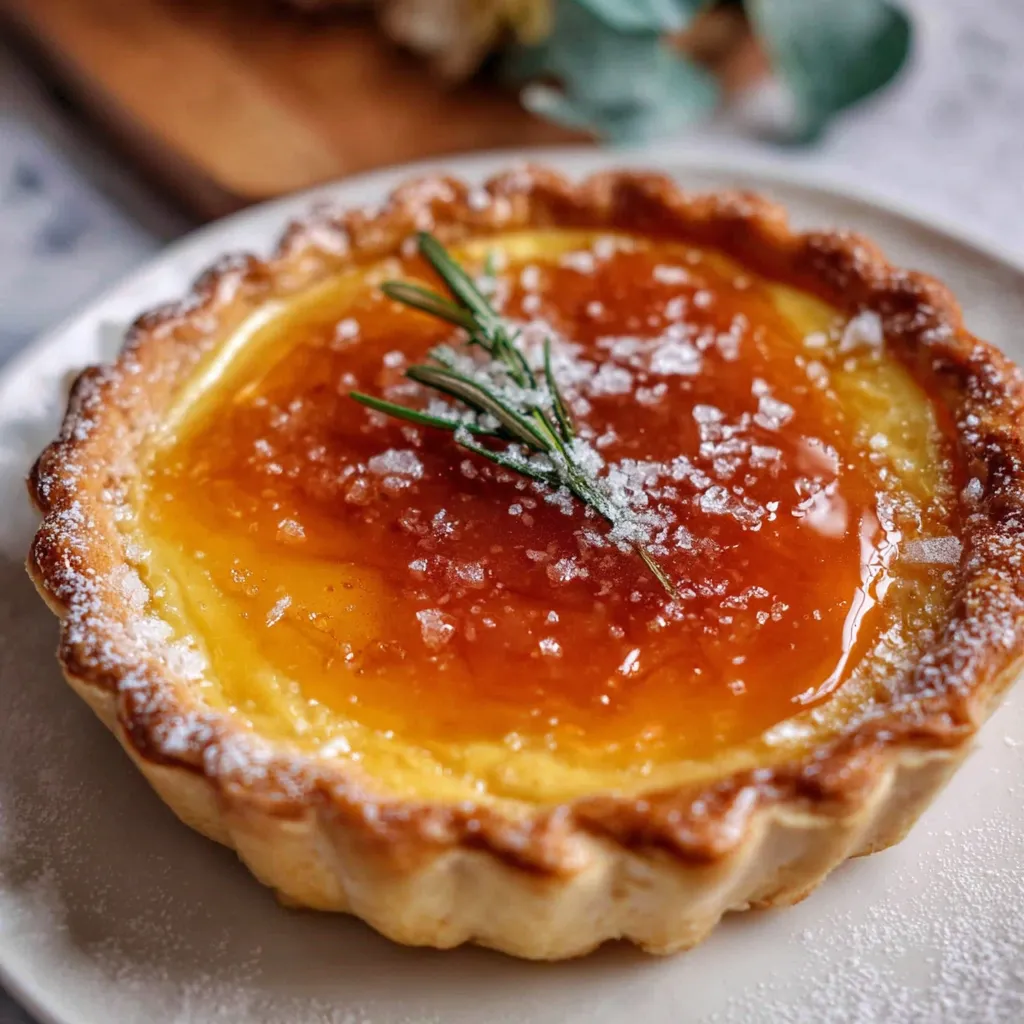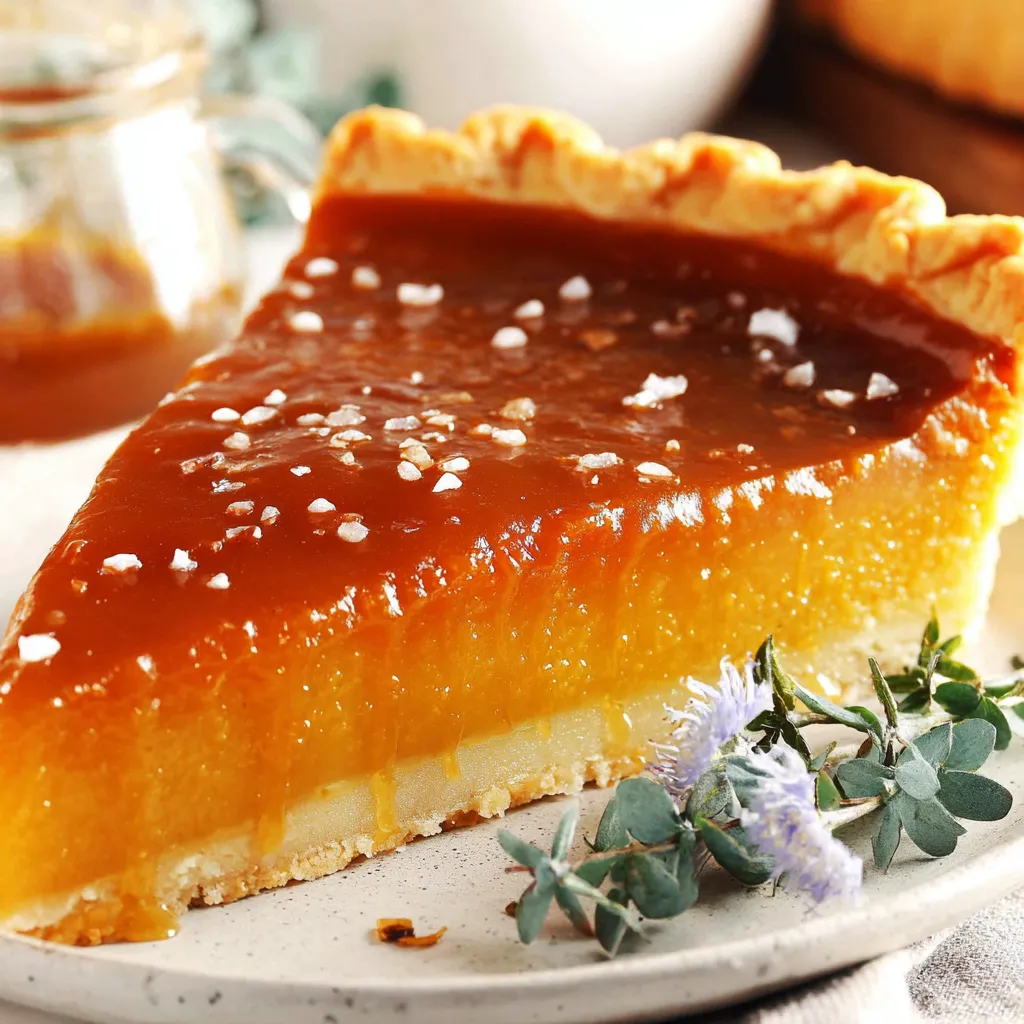 Bookmark
Bookmark
This hearty Salted Honey Pie brings together the perfect balance of sweet and salty flavors in every bite. The luscious, creamy custard filling delivers rich caramelized notes with a delightful hint of sea salt that elevates this dessert to something truly special. Wrapped in a flaky butter crust, it's a dessert that feels both comforting and sophisticated at the same time.
I first made this pie for a holiday gathering when I wanted something different from the usual pumpkin or apple options. The reaction was immediate everyone asked for the recipe, and now it's requested at every family celebration. The way the honey caramelizes during baking creates a depth of flavor that store bought desserts simply cannot match.
Ingredients
- Heavy whipping cream creates the luxurious texture that makes this pie so indulgent
- Honey forms the heart of this dessert providing complex sweetness that regular sugar cannot match
- Light brown sugar adds a molasses note that enhances the honey flavor
- Egg yolks give the custard its silky smooth consistency and rich mouthfeel
- Cornstarch ensures the filling sets properly without becoming rubbery
- Flaky sea salt provides the crucial contrast that makes each bite interesting
- Vanilla extract rounds out the flavor profile with warm aromatic notes
Step-by-Step Instructions
- Prepare the Pie Crust
- Begin with either a refrigerated or homemade crust in an 8 or 9 inch pie pan. No need to prebake simply chill it while preparing the filling. The cold crust creates the perfect flaky texture when baked and helps prevent shrinking. For extra flavor consider sprinkling a little sugar on the crust edges before baking for a sweet crunch.
- Heat the Cream Mixture
- Combine heavy cream, brown sugar, cornstarch, and salt in a medium saucepan over medium heat. Stir constantly until the mixture reaches a rolling boil and begins to thicken. Watch as the aroma of caramelizing brown sugar fills your kitchen. The mixture will gradually become more substantial as the cornstarch activates. Keep stirring to prevent any lumps from forming.
- Temper the Eggs
- After the cream mixture boils, remove from heat and carefully temper the egg yolks. This critical step prevents scrambling the eggs. Slowly ladle small amounts of the hot cream into the beaten egg yolks while whisking continuously. Gradually add more cream, always whisking, until the eggs are fully incorporated and smooth. Taking your time here ensures a perfectly silky custard.
- Combine the Mixture
- Return the tempered egg mixture to the saucepan with any remaining cream. Stir until completely smooth. Add the honey and vanilla extract, incorporating thoroughly. The honey infuses the custard with its distinct sweetness while the vanilla provides aromatic depth. This combination creates the signature flavor profile that makes this pie so memorable.
- Fill the Pie Crust
- Pour the warm custard mixture into your chilled pie crust, spreading evenly to eliminate air pockets. The filling should have a thick, creamy consistency with a beautiful pale golden color. Make sure to distribute it uniformly so every slice has the same delicious texture and flavor profile.
- Bake the Pie
- Place in a preheated 375°F oven and bake for 40 to 45 minutes. During baking, the pie will bubble and the top will develop a gorgeous golden brown color. The filling will firm up while creating a slightly caramelized top layer. The edges of the crust will turn golden creating a beautiful frame for the custard. Expect some jiggling when removed from the oven this is normal and will set during cooling.
- Cool and Set
- Allow the pie to cool completely at room temperature first. During this time, the custard continues setting to the perfect consistency. Once cooled, refrigerate until thoroughly chilled and firm. This cooling process is essential for developing the full flavor profile as the honey and vanilla notes meld together beautifully. Proper chilling ensures clean, perfect slices.
- Finish with Sea Salt
- Just before serving, sprinkle a generous amount of flaky sea salt over the top. This final touch creates the magical sweet salty balance that makes this pie extraordinary. The delicate crunch of sea salt crystals adds textural contrast and bursts of saltiness that highlight the honey sweetness in each bite.
 Bookmark
Bookmark
Honey is truly the star ingredient in this recipe. I discovered that using different varieties of honey can completely transform the flavor profile. My personal favorite is wildflower honey which brings subtle floral notes that complement the caramelized sugars. Every spring when local honey becomes available, I stock up specifically to make this pie throughout the year.
Storage Tips
This pie stores beautifully in the refrigerator for up to five days, though it rarely lasts that long in my house. Cover loosely with plastic wrap or place in a pie keeper to prevent the top from collecting moisture. The flavors actually continue to develop during refrigeration, making this an ideal make ahead dessert. For longer storage, you can freeze individual slices wrapped tightly in plastic wrap and aluminum foil for up to one month. Thaw overnight in the refrigerator before serving.
Honey Varieties and Their Impact
The type of honey you choose significantly influences the final flavor of your pie. Clover honey provides a mild, classic sweetness that lets other ingredients shine. Buckwheat honey creates a deeper, more robust flavor profile with almost molasses like notes. Orange blossom honey contributes subtle citrus undertones that brighten the overall taste. For a truly special occasion, try using lavender or sage honey which will infuse the pie with delicate herbal notes. Local artisanal honey often contains unique flavor characteristics reflecting your regional flora.
Serving Suggestions
While this pie is absolutely delicious on its own, there are several ways to elevate the presentation. A dollop of lightly sweetened whipped cream provides a cool, creamy contrast to the rich filling. For texture contrast, consider adding some chopped toasted nuts like pecans or walnuts around the edge of each slice. This pie pairs beautifully with beverages too try serving with a small glass of bourbon for adults or a cup of strong black coffee to balance the sweetness. For summer gatherings, add a few fresh berries on the side for a pop of color and freshness.
Recipe FAQs
- → Can I make this pie ahead of time?
Absolutely! This Salted Honey Pie actually benefits from being made a day ahead. The flavors deepen and the custard sets perfectly when refrigerated overnight. Just add the flaky sea salt right before serving for the best texture contrast.
- → What type of honey works best for this pie?
While any honey will work, varieties with distinct flavors like wildflower, buckwheat or orange blossom add wonderful complexity. Darker honeys generally provide a more robust flavor that stands up beautifully to the sea salt. Avoid using honey that's crystallized unless you melt it first.
- → How do I know when the pie is done baking?
The pie is ready when the edges are set but the center still has a slight jiggle when gently shaken - similar to how you'd check a cheesecake. The top should be golden brown, and a toothpick inserted about an inch from the edge should come out clean. Remember it will continue setting as it cools.
- → What's the best way to slice this pie cleanly?
For clean slices, chill the pie thoroughly first - at least 4 hours or overnight is ideal. Use a sharp knife dipped in hot water and wiped clean between cuts. The cold filling will hold its shape better, allowing for picture-perfect slices.
- → Can I make this pie without dairy?
Yes, you can substitute the heavy cream with full-fat coconut milk for a dairy-free version. The texture will be slightly different but still delicious. For the crust, use a plant-based butter alternative or coconut oil to maintain that flaky texture.
- → What type of sea salt should I use for topping?
Flaky sea salt like Maldon or fleur de sel works best for topping this pie. These salts provide delicate, crunchy crystals that dissolve slowly on the tongue, creating perfect bursts of saltiness against the sweet filling. Avoid using fine table salt which would dissolve immediately and potentially make the pie too salty.
